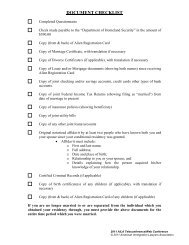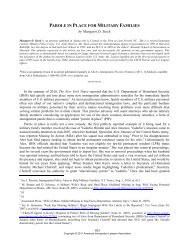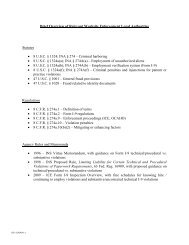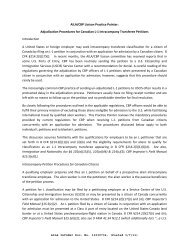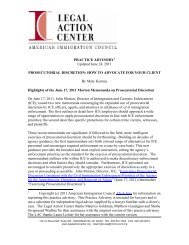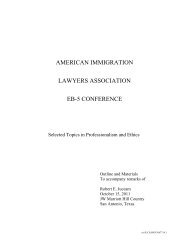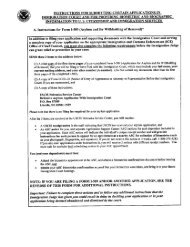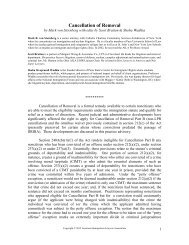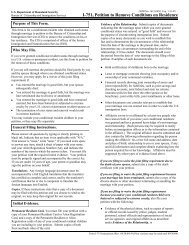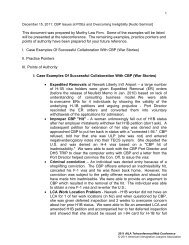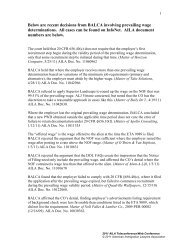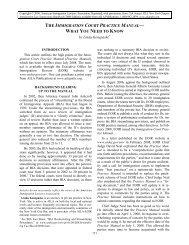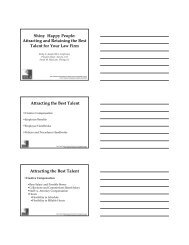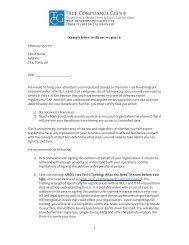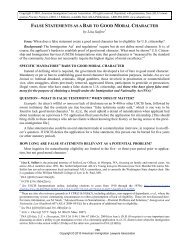Immigration Practice Pointers, 2010-11 Ed. - AILA webCLE
Immigration Practice Pointers, 2010-11 Ed. - AILA webCLE
Immigration Practice Pointers, 2010-11 Ed. - AILA webCLE
Create successful ePaper yourself
Turn your PDF publications into a flip-book with our unique Google optimized e-Paper software.
SUBJECT: Additional Guidance Regarding Surviving Spouses of<br />
Deceased U.S. Citizens and their Children (FY201 0 DHS Appropriations Act)<br />
AFM Update 10-09<br />
Page 6<br />
motion. Since no Form 1-130 is required for a K-I nonimmigrant to seek adjustment after<br />
marrying the K petitioner within the period specified by statute, the K-1 nonimmigrant will also<br />
be deemed the beneficiary ofa Form 1-360 ifthe K-1 nonimmigrant now qualifies as a<br />
widow(er). The K-1 nonimmigrant still may not adjust on any basis other than the K-1<br />
nonimmigrant's having married the citizen petitioner who filed the Form 1-129F.<br />
Some aliens may have been placed into removal proceeding after USCIS denied their Forms 1<br />
485. Except for "arriving aliens," this factor would mean that USCIS no longer has jurisdiction<br />
to adjudicate the Form 1-485. 8 C.F.R. § 245.2(a)(1) and 1245.2(a)(1). USCIS would have<br />
jurisdiction to adjudicate the Form 1-485 only ifthe Executive Office for <strong>Immigration</strong> Review<br />
(EOIR) terminated the removal proceeding. Whether to support or oppose terminating a removal<br />
proceeding is a matter for U.S. <strong>Immigration</strong> and Customs Enforcement to decide, not USCIS. If<br />
a USCIS office reopens a Form 1-130 involving an alien in removal proceedings, the USCIS<br />
office must, through the appropriate USCIS counsel, advise the local counsel for U.S.<br />
<strong>Immigration</strong> and Customs Enforcement.<br />
Some aliens whose citizen spouses had died may have left the United States voluntarily, without<br />
obtaining a grant ofadvance parole. Others may have left after obtaining advance parole, but<br />
may have remained abroad after expiration ofthe Form 1-512. Under 8 C.F.R. §<br />
245.2(a)(ii)(4)(B), these aliens have abandoned their adjustment applications. Also ~bandoned is<br />
the adjustment application ofan alien who left as the result ofremoval proceedings. 8 C.F.R. §<br />
245.2(a)(4)(ii)(A). In these situations, a Form 1-485 will not be deemed "pending" for purposes<br />
ofsection 568(c)(2)(A). However, where section 568(c) applies to the approved Form 1-130, and<br />
the Form 1-130 has been approved as a Form 1-360, the alien approved on that 1-360 who has left<br />
the United States may apply for an immigrant visa abroad.<br />
3. Petition already approved before death<br />
Ifa widow(er) is the beneficiary ofa Form 1-130 that was approved before the citizen<br />
petitioner's death, it is not necessary for the widow(er) to request humanitarian reinstatement of<br />
the approval. Under 8 C.F.R. § 204.2(i)(1 )(iv), the approved Form 1-130 is automatically<br />
converted to an approved Form 1-360. Any children ofthe widow(er) will also be eligible to<br />
seek an immigrant visa or adjustment ofstatus based on the converted petition.<br />
There may be some cases in which a spousal immediate relative Form 1-130 was approved, but<br />
the approval was revoked automatically under 8 C.F.R. 205. 1(a)(3)(i)(C) upon the citizen<br />
petitioner's death. Ifthe alien is now eligible for classification as the widow(er) ofa citizen<br />
under section 568(c)(2)(A) ofthe FY<strong>2010</strong> DHS Appropriations Act, the approval will be<br />
deemed to have been reinstated, effective October 28,2009. No separate request for<br />
reinstatement is necessary. Under 8 C.F.R. § 204.2(i)(1)(iv), the Form 1-130 will be deemed to<br />
be an approved Form 1-360.<br />
<strong>AILA</strong> InfoNet Doc. No. 09121430. (Posted on 12/14/09).



